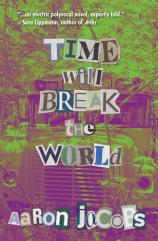Time Will Break the World
Review
Time Will Break the World
Separating life from art is not easy, especially when it comes to the 1976 Chowchilla, CA school bus kidnapping. And TIME WILL BREAK THE WORLD, based on the same subject, is an uneasy art.
The real crime was apparently so far out in left field that madnesses like the Manson Family massacre and Ted Bundy’s monstrosities are part of contemporary conversation, yet Chowchilla has somehow been set aside like the names of the kidnappers and still-living victims.
A “48 Hours” documentary on the Chowchilla event details how 26 schoolchildren, ages five to 14, were abducted by three wealthy, spoiled and psychotic idiots who ran through their savings accounts and wanted $5 million in ransom from the state of California, as if they deserved it. Instead of throwing these miscreants in prison for life, the state set them free after only 30 years and something like 60 parole hearings.
"Our fearsome Mashburn sisters invite more trouble by stalking the men who kidnapped them in the first place, yet the comeuppance is rather hip in Jacobs’ fictional take."
Enter Aaron Jacobs. In TIME WILL BREAK THE WORLD, he examines the minds of selected characters, none of whom are based on the actual victims, and how the trauma of Chowchilla haunted them ever since.
With Jacobs’ change in time zones, the book begins in 1984 and brings readers to 2013, when Brenda and Emily Mashburn are face-to-face with their kidnappers, Jason and Calvin Schott. The twin sisters attempt to make a documentary on the event that ruined their childhoods and is now eating away at the rest of their lives. As the story flexes between 1984 and 2013, the devious Schott brothers have lost their family money, yet greed tells them that kidnapping a “precious” busload of kids in exchange for $5 million is a cool idea.
In Jacobs’ “Chowchilla 1984,” Calvin ponders the doom he’s planning for each character in the book, including himself, with the Summer Olympics as a backdrop --- one of the reasons Chowchilla never became part of the collective consciousness: “I didn’t know what blood doping was. I didn’t know about the rank hypocrisies and moral failings of the International Olympic Committee and its chairman, Avery Brundage, who after WWII allowed known Nazis and Italian fascists to remain on the committee.” It doesn’t take a brainiac to know that the Olympics suck.
There is no world peace, and Calvin is still ignorant of this. He grew up during the 1968 murders in Mexico, the 1972 killings in Munich, and the steroids of 1976. To Calvin, life itself is vague, including the challenges that he and his brother face in the loose hypnosis of a catty land grabber who hijacks their cash, right at the same time that their mother, Bertie (think insane, domineering Cincinnati Reds baseball queen Marge Schott), starts charging the loveless, sexless “boys” rent if they intend to keep living at home.
Jacobs subtly says that America’s mundane Olympics obsession consumed the media’s focus from the largest kidnapping event in our history. What makes this book tough is Trumpian callousness --- of the crime and our criminal “justice” system --- so the Schott brothers wind up getting out of prison to haunt the once-child victims now in adulthood. Our fearsome Mashburn sisters invite more trouble by stalking the men who kidnapped them in the first place, yet the comeuppance is rather hip in Jacobs’ fictional take.
TIME WILL BREAK THE WORLD takes us beyond the forgotten and into the minds of American children as victims. We take a 120-mile detour that sometimes literally buries you and me under miles of bullsh*t, so we are "existentially unlucky," if anything, to make it back home again.
Beware, America. There’s a new 1935-era Thomas Wolfe in the driver’s seat.
Reviewed by Rachael Stark on July 28, 2023
Time Will Break the World
- Publication Date: July 1, 2023
- Genres: Fiction, Literary Fiction, Suspense, Thriller
- Paperback: 294 pages
- Publisher: Run Amok Crime
- ISBN-10: B0C4G1FMBR
- ISBN-13: 9798986993027










